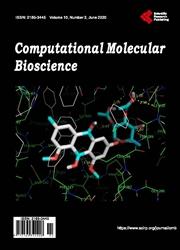Molecular Docking and Pharmacological Property Analysis of Phytochemicals from Clitoria ternatea as Potent Inhibitors of Cell Cycle Checkpoint Proteins in the Cyclin/CDK Pathway in Cancer Cells
引用次数: 20
Abstract
Cancer comprises a group of diseases which are involved in the aberrant growth of the cells causing disruption of normal body function. Due to the lack of proper sophisticated treatments this nasty disease leads to the death of most of the patients affected with it. Moreover, treatments like chemotherapy involve other post-treatment complications which make them unfavorable for extended use. Medicinal plants possess many phytochemicals of great therapeutic value and many of them are effective in killing cancer cells. These compounds working by variety of mechanisms and in most of the cases exhibit their anticancer potentiality by inhibiting many proteins involved in cell growth and division. Molecular docking is a computational approach which facilitates the finding of the best molecule from a group which may bind with the highest affinity with the intended target by providing a virtual biological system. This process works on the basis of specific algorithm and involves scoring function to rank the molecules that fit with the target. This study has been designed to investigate the potentiality of four phytochemicals from Clitoria ternatea—Kaempferol, Myricetin, P-Hydroxycinnamic acid and Quercetin as inhibitors of two cell cycle checkpoint proteins—Cyclin Dependent Kinase-2 (CDK-2) and Cyclin Dependent Kinase-6 (CDK-6) in Cyclin/CDK pathway. Quercetin and Myricetin docked with higher affinity with CDK-2 and CDK-6 respectively. Drug likeness property analysis and ADME/T test impose computational approach to investigate physicochemical and pharmacological properties of candidate drug molecules. P-Hydroxycinnamic acid performed well in both drug likeness property analysis and ADME/T than Quercetin and Myricetin. So, P-Hydroxycinnamic acid is the best finding of this experiment.癌症细胞周期蛋白/CDK通路细胞周期检查点蛋白的分子对接及药理性质分析
癌症包括一组疾病,这些疾病与细胞的异常生长有关,导致正常身体功能的破坏。由于缺乏适当的先进治疗方法,这种令人讨厌的疾病导致大多数患者死亡。此外,化疗等治疗涉及其他治疗后并发症,这使得它们不适合长期使用。药用植物具有许多具有重要治疗价值的化学物质,其中许多具有杀伤癌细胞的作用。这些化合物通过多种机制起作用,在大多数情况下,通过抑制参与细胞生长和分裂的许多蛋白质,显示出它们的抗癌潜力。分子对接是一种计算方法,它通过提供一个虚拟的生物系统,方便地从一组分子中找到与预期靶标具有最高亲和力的最佳分子。这个过程是在特定算法的基础上进行的,并涉及到评分函数来对符合目标的分子进行排序。本研究旨在研究三阴藤中的四种植物化学物质-山奈酚、杨梅素、对羟基肉桂酸和槲皮素作为细胞周期检查点蛋白-细胞周期蛋白依赖性激酶-2 (CDK-2)和细胞周期蛋白依赖性激酶-6 (CDK-6)在细胞周期蛋白/CDK通路中的抑制作用。槲皮素和杨梅素分别与CDK-2和CDK-6具有较高的亲和性。药物相似性分析和ADME/T测试采用计算方法研究候选药物分子的物理化学和药理学性质。对羟基肉桂酸的药物相似性分析和ADME/T均优于槲皮素和杨梅素。因此,对羟基肉桂酸是本实验最好的发现。
本文章由计算机程序翻译,如有差异,请以英文原文为准。
求助全文
约1分钟内获得全文
求助全文

 求助内容:
求助内容: 应助结果提醒方式:
应助结果提醒方式:


